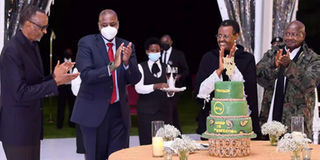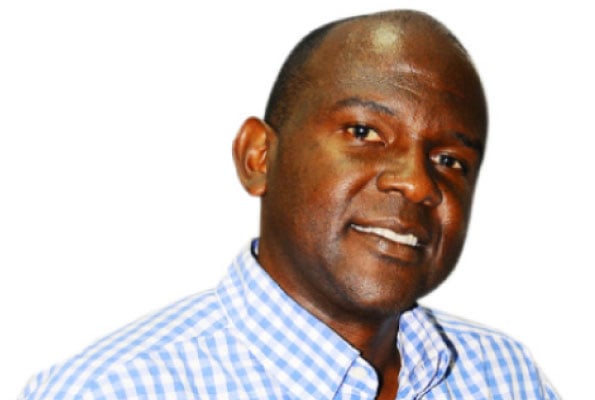Prime
Is former ‘LDU’ Muhoozi eyeing seat of Commander-in-Chief?

Left to right: Rwandan president Paul Kagama, First Son Lt Gen Muhoozi Kainerugaba, First Lady Janet and President Museveni at a dinner at State House Entebbe to mark Muhoozi’s 48th birthday last weekend. PHOTO / COURTESY
What you need to know:
- Lt Gen Muhoozi Kainerugaba’s emergence onto the rough and tumble of Ugandan politics can only be compared to the mysterious way he got into the army. In 1997, then Bufumbira East MP Eddie Kwizera dramatically recommended on the floor of the House that Muhoozi be put in jail for “recruiting and training the army”, writes Derrick Kiyonga.
Former Libyan leader, Col Muammar Gaddafi, who was killed by his own people in 2011, had always had a fairly alienated relationship with Kampala, but in 2001 he attended President Museveni’s swearing-in at Kololo Independence Grounds.
By the time he jetted out of town, Mr Museveni’s son, Muhoozi Kainerugaba, who at the time was the officer in-charge of Combat Readiness and Operations in the Presidential Protection Unit (PPU), had been promoted to the rank of Major from 2nd Lieutenant.
PPU has long been abolished and subsequently replaced by an outfit that Muhoozi has now led twice – the Special Forces Command (SFC) – but certain things never change: last weekend, Rwandan President Paul Kagame, who like Gaddafi has had a frosty relationship with Kampala, jetted in ostensibly to celebrate Muhoozi’s 48th birthday.
But by the time his two days stay in Uganda was done, it was apparent that Muhoozi’s presidential dream had been launched.
For three years the Rwandan government had shut down its mainland border with Uganda, Gatuna, on unverified accusations that Uganda was harbouring its enemies, but in his speech Kagame gave credit to Muhoozi for moving heaven and earth to ensure that relations are restored.
According to sources that attended the party, Kagame, who was an intelligence officer in Museveni’s National Resistance (Army), said Muhoozi had contacted his friend asking for Kagame’s contact.
“The friend told Kagame that Muhoozi was looking for his number. Kagame then allowed Muhoozi to make that call in which they agreed to meet him in Kigali,” the source says.
When they met in Kigali, Kagame, without going into detail, said they had a frank conversation and from their onward, the relationship between Uganda and Rwanda started to be repaired.
Most importantly, according to multiple sources that attended the function, Kagame, who Muhoozi has lately been calling “uncle” told Museveni that since his three-star-General son had gone out of his way to solve a problem that had put the two countries on a collision course, he is “ready for bigger things”.
In his speech, Museveni was futuristic: warning that while he is patient, his son doesn’t share the same trait when it comes to the corrupt. Though this statement has been interpreted as Museveni’s intent to abdicate in favour of his son, sources say the President was warning the corrupt in the army, where Muhoozi commands the Lands Forces.
From 2019, or thereabout, Muhoozi has recast his role from that of a military officer to that of a diplomat and he has openly used his Twitter handle to show meetings he has held, not just with Kagame, but also with Germany ambassador Matthias Schauer, Kenyan president Uhuru Kenyatta, Egyptian president Abdel Fattah el-Sisi, and Lt Gen Osama Askar, Chief of the General Staff of the Egyptian military, who he said is the equivalent to Uganda’s Chief of Defence Forces (CDF), inter-alia.
When he met Schauer last year, Muhoozi said: “We spoke of increased military cooperation between Uganda and Germany.”
And when he met the Egyptians this year, he tweeted: “We discussed enhancing our strategic defence alliance and building on more than 25 years of defence cooperation. There will be greater and more solid actions in pursuit of our common security interests in the region.”
With questions mounting about whether Muhoozi can replicate his father’s set of skills to mount a serious presidential campaign, it seems he chooses to show his skills via diplomacy to make a point.
“You can have diplomacy with the Americans but when you do it within the region it can score somebody some points, especially the traders who were suffering at Katuna and they lost out in their businesses and now that person can gain if it’s attributed to him, even if it wasn’t him because I read from somewhere that Kagame said the issues weren’t Muhoozi, he knew the message was from his father,” Mwambutsya Ndebesa, a political historian at Makerere University, says.
“The issues at the border was between Kagame and Museveni and Muhoozi was used as an envelope.”
Muhoozi’s venture into diplomacy and use of social media has also raised questions if at all he is governed by military law which, at least on paper, asks soldiers to steer clear of politics.
At the peak of last year’s campaigns, Muhoozi and National Union Platform (NUP) principal Robert Kyagulanyi, popularly known as Bobi Wine, set the tone of what Uganda’s politics is to become.
In the fall of 2020, when Kyagulanyi was detained by police after being nominated as a presidential candidate, Muhoozi took it upon himself to guarantee the former Kyadondo East MP that more was to come.
“I told you, my young brother, that you can never intimidate us. We are much stronger than you can ever imagine being. If you want to fight, we will simply defeat you. We want peace! But if you attempt to fight us, then bring it on!” Muhoozi tweeted.
But Kyagulanyi was undeterred – he shot back, also using Twitter: “Only cowards and weak men boast of violence! You should be ashamed. Ours is a non-violent call for action. You know that in a free and fair election, your father, the old tyrant, would be no more. This country belongs to Ugandans, not you and your father. You will soon understand that.”
Muhoozi went as far as addressing political rallies when he canvassed support for Shartsi Musherure, the daughter of former Foreign Affairs minister Sam Kutesa, who went on to replace her father as Mawogola North Member of Parliament after her would-be challenger Godfrey Aine Kaguta Sodo, Museveni’s younger brother, dropped out of the race.
“I am an army officer, not a politician. Ms Musherure is my in-law. She is a twin sister to my wife and what I know about her is that she is religious, trustworthy and not a thief,” Muhoozi said.
Back on social media, Muhoozi ruffled feathers last year when he seemingly supported the Tigrayan forces who were engaged in a civil war against Addis Ababa.
“I don’t know why my brothers in Ethiopia are fighting me?” Muhoozi asked. “It makes me sad. You are now fighting my tribe in Tigray. Tigrayans are part of us. God is the one who protects us!”
He added: “I urge my great and brave brothers in the Tigrayan Defence Forces to listen to the words of Gen Yoweri Museveni. I am as angry as you and I support your cause. Those who raped our Tigrayan sisters and killed our brothers must be punished!”
A motley crew of army officers such as Generals David Sejusa and Henry Tumukunde have previously been charged at the General Court Martial for engaging in partisan politics, but it seems Muhoozi is insulated against such.
“It’s his father who is doing that. First of all, I don’t see how an army commander, which he is, is given other special duties that are not even announced,” Ndebesa says, referring to Muhoozi’s docket of being his father’s advisor on what is termed as “special operations”.
“An army commander should be involved with issues involving the army, but to be given special duties that are not even made public is to say you can use the army as well as diplomacy. So, for him even if he becomes political, maybe he can’t be held accountable, but an army officer involved in special duties can do politics. That special something, that’s not defined. Means he can do anything.”
Muhoozi’s emergence onto the rough and tumble of Ugandan politics can only be compared to the mysterious way he got into the army.
In 1997, then Bufumbira East MP Eddie Kwizera dramatically recommended on the floor of the House that Muhoozi be put in jail.
“If Muhoozi is recruiting and training the army, then he is violating the Constitution. He should be arrested and charged,” Kwizera said, adding: “To raise an army, you must be authorised. Who authorised Muhoozi? If it is the President, he violated the Constitution.”
Reports that incensed Kwizera had emerged that Muhoozi, who had just finalised his studies at Nottingham University in the United Kingdom and had no military background, was recruiting fresh graduates from Makerere University to join the Uganda People’s Defence Forces.
The recruits, about 100 in number, it was reported, trained at Kasenyi on the shores of Lake Victoria and would later “morph into an elite presidential guard”. Within years, the Presidential Guard Brigade (PGB), which later morphed into SFC, was in fact formed while Muhoozi’s role in it was cited in undertones and grapevine.
The government official who responded to Kwizera’s queries was Amama Mbabazi, then State minister for Defence. He brushed aside reports that Muhoozi was recruiting on behalf of the army, sticking his neck out that this was additional pseudo-militia, the Local Defence Unit (LDU).
“People have been encouraged to carry out the recruitment of LDUs. Government is ready to facilitate you to help train cadres,” said Mbabazi, who had been pressed.
It was Museveni who first defended Muhoozi’s moves, equating him to LDU. “He did so with my knowledge. I see nothing wrong with that,” Museveni said, though Norbert Mao, then Gulu Municipality MP, said the recruitment was dubious, illegal and unacceptable. His cries were largely ignored as the First Son went ahead to assemble an outfit that is said to now be loyal to him.
Critics say the NRA old guard is out of the way and Muhoozi loyalists such as Maj Gen Sabiiti Muzeyi, the general manager of Luweero Industries Ltd; Brig Felix Buzisoori, the acting commander of SFC; Brig Charity Bainababo, the deputy commander of SFC; Brig Daniel Kakono, the commander of Field Artillery Division; and Don Nabaasa who previously commanded the SFC but now heads the Military Police, are now the new face of the army.
“You can see that the father thought about this transition very well, but everything is personalised. You saw on his birthday he came in military fatigues and the Ugandan flag. What has the Ugandan flag got to do with a personal birthday party?” Ndebesa said.
Maverick Luweero veteran Gen David Sejusa was the first military officer to talk about the “Muhoozi project” when in 2013 he penned a dossier asking for an investigation into an alleged plot against those he said accused Museveni of mentoring his son to succeed him as President.
Muhoozi and NRM have denied that there was always a plot to see him succeed his father, what is now termed “a political monarch” but they have never ruled out Muhoozi standing for presidency, always contending that Ugandans are free to choose a president of their choice.
“He can run for any political office if he wants. The only problem that I see if he is really interested in leading the army, President Museveni who should know these things, should have released him from that army. The moment you let Gen Muhoozi who is in uniform, he is an army officer, into politics you are dragging in the entire army apparatus. That has its own problems,” Gen Mugisha Muntu, who commanded the army in the 90s but has since become one of Museveni’s fiercest critics, says.





